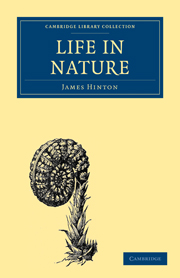Book contents
- Frontmatter
- Contents
- INTRODUCTION
- CHAPTER I OF FUNCTION; OR, HOW WE ACT
- CHAPTER II OF NUTRITION; OR, WHY WE GROW
- CHAPTER III OF NUTRITION; THE VITAL FORCE
- CHAPTER IV OF LIVING FORMS; OR, MORPHOLOGY
- CHAPTER V OF LIVING FORMS; THE LAW OF FORM
- CHAPTER VI IS LIFE: UNIVERSAL?
- CHAPTER VII THE LIVING WORLD
- CHAPTER VIII NATURE AND MAN
- CHAPTER IX THE PHENOMENAL AND THE TRUE
- CHAPTER X FORCE
- CHAPTER XI THE ORGANIC AND THE INORGANIC
- CHAPTER XII THE LIFE OF MAN
- CHAPTER XIII CONCLUSION
- APPENDIX: AN ATTEMPT TOWARDS A MORE EXTENDED INDUCTION OF THE LAWS OF LIFE
- Frontmatter
- Contents
- INTRODUCTION
- CHAPTER I OF FUNCTION; OR, HOW WE ACT
- CHAPTER II OF NUTRITION; OR, WHY WE GROW
- CHAPTER III OF NUTRITION; THE VITAL FORCE
- CHAPTER IV OF LIVING FORMS; OR, MORPHOLOGY
- CHAPTER V OF LIVING FORMS; THE LAW OF FORM
- CHAPTER VI IS LIFE: UNIVERSAL?
- CHAPTER VII THE LIVING WORLD
- CHAPTER VIII NATURE AND MAN
- CHAPTER IX THE PHENOMENAL AND THE TRUE
- CHAPTER X FORCE
- CHAPTER XI THE ORGANIC AND THE INORGANIC
- CHAPTER XII THE LIFE OF MAN
- CHAPTER XIII CONCLUSION
- APPENDIX: AN ATTEMPT TOWARDS A MORE EXTENDED INDUCTION OF THE LAWS OF LIFE
Summary
We may endeavour to cast a glance on some of the subjects which thus open themselves out before us, and briefly note how the phenomena of the physical world present themselves as a book to be read by the light of our moral and emotional nature. First among these subjects stands Force.
We are familiar enough by our own experience with the idea which this word conveys. We use force whenever we effect any motion of ourselves or other things; we feel it as acting on us when we are moved. Naturally from this basis we extend the idea into the whole series of physical events, and conceive a force as operating in every change which takes place around us. But in this natural idea we are not suffered to remain. It is true we feel force, and cannot but feel it, when we are conscious of exerting ourselves either for action or resistance; but also, almost whenever we are conscious at all, we feel sensations—of pleasure, pain, light, sound, or taste, and so on. Yet, though feeling these, we do not infer the existence of such sensations in nature. They are our own merely; only the child fancies his pleasure or pain to be also in the things that impart it to him. But that which the child does in ascribing his feeling of pain to the insensitive table, we do in ascribing our feeling of force, which is really that of exertion, to the material world.
- Type
- Chapter
- Information
- Life in Nature , pp. 189 - 195Publisher: Cambridge University PressPrint publication year: 2009First published in: 1862

